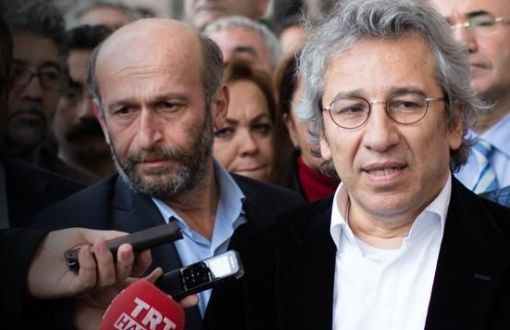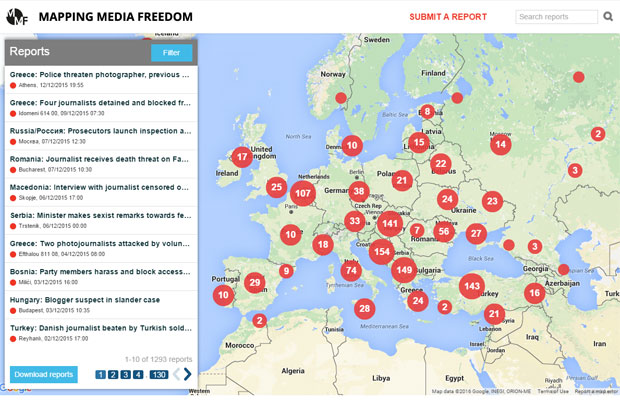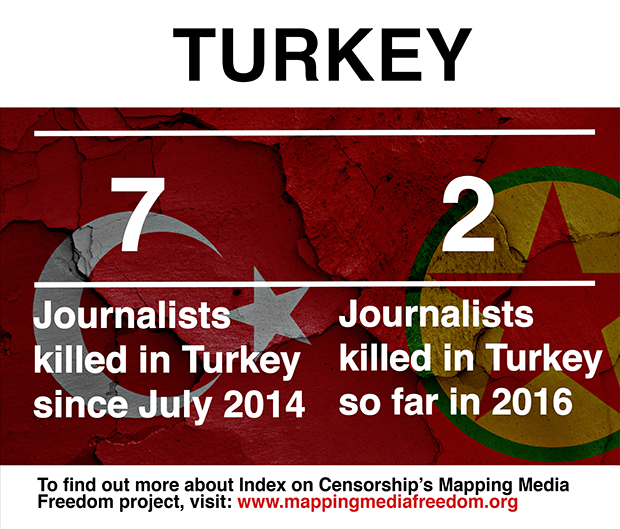1 Mar 2016 | Europe and Central Asia, Mapping Media Freedom, mobile, News, Turkey

Turkish President Recep Tayyip Erdogan (Photo: Philip Janek / Demotix)
The ongoing deterioration in Turkey’s press freedom has been well documented by Index on Censorship’s Mapping Media Freedom project since its launch in 2014. The crackdown appears to be getting worse, according to a new report by Amnesty International this month. It states that the “human rights situation deteriorated markedly” in Turkey in 2015, as did respect for freedom of expression, including criminal detention though anti-terror laws and the targeting of anyone critical of government policy.
Despite the welcome release of Cumhuriyet journalists Can Dündar and Erdem Gül on 26 February, the situation for media freedom looks uncertain. Here are some of the most worrying reports from February.
Journalists killed
In total, Mapping Media Freedom has recorded the deaths of 15 journalists since July 2014. Seven of these deaths have occurred in Turkey, two of those in this year alone. Gülsen Yıldız, a journalist working in Ankara for Tarim TV, was killed on 18 February. She was among 28 people who died during a terrorist attack on passing military vehicles in the capital.
Later in February, the discovery of a body, later identified as journalist Rohat Aktaş, in the southeastern town of Cizre. Aktaş had been shot in the arm in late January while covering efforts to help those wounded during clashes between Kurdish separatists and Turkish forces.
On 24 February, Dicle-Haber reported that Aktaş’ body was identified by DNA tests carried out by the forensic authority. “Scores” of people are reported to have been killed in Cizre following a raid by security services on buildings they say harboured Kurdish separatist fighters. The exact details of Aktaş’ death are currently unknown.
Journalists detained on anti-terror charges
This year began on a somewhat positive note with the 5 January release of VICE News journalist Mohammed Ismael Rasool. Rasool, an Iraqi Kurdish reporter, had been detained since 27 August 2015 while reporting in the country’s southeast and charged with working for a terrorist organisation.
On 11 February, Nazım Daştan, a journalist for Dicle News Agency (DİHA), which reports in Kurdish, was arrested in Gaziantep on charges of spreading online propaganda for the Kurdistan Workers’ Party (PKK), which the Turkish state lists as a terrorist group. On the next day, he was brought to testify in court and then taken to jail.
On the same date, Feyyaz İmrak, also journalist for Dicle News Agency (DİHA), was arrested along with 16 others on charges of being members of the PKK. Police searched his home and confiscated his reporting equipment and notes.
İmrak appeared before a criminal court 15 February to hear the charges against him, and is currently being held at Antalya Prison, pending trial.
Journalists denied access
For any journalist, access to sources is essential for their ability to carry out their duties. The denial of access is a major problem for journalists in Turkey, something foreign journalists know all too well.
On 9 February, Turkish authorities rejected a permanent press accreditation application filed by Silje Rønning Kampesæter, a correspondent for Norway’s Aftenposten. The press accreditation application also affects her residence permit in Turkey. No reason was given for the rejection.
The authorities also detained Claus Blok Thomsen, a Danish journalist working for Denmark’s daily newspaper Politiken, at the Istanbul airport, barring him from entering the country. The journalist was seeking access to report on refugees at the Turkish-Syrian border.
When Thomsen identified himself as a journalist, police forced him to open his phone and computer, undermining the confidentiality of his sources. He was then detained in a cell overnight and put on a plane to Copenhagen the next day. He was reportedly told to not try re-entering Turkey.
Also see:
Statement: Index condemns seizure of Zaman
Sign Our Petition: End Turkey’s crackdown on press freedom
Letter: Writers and artists condemn seizure of Zaman news group
Reaction: Turkish court orders seizure of Zaman news group
This article was originally published at Index on Censorship.
25 Feb 2016 | About Index, Campaigns, Mapping Media Freedom, Turkey
Index on Censorship welcomes the release of journalists Can Dündar and Erdem Gül after Turkey’s Constitutional Court ruled that their rights had been violated by their arrest. Index strongly reiterates its call for Turkish authorities to drop all charges against the pair.
Dündar, the editor-in-chief of the Turkish daily Cumhuriyet, and his Ankara bureau chief, Gül, had been held since the evening of 26 November. They are charged with spying and terrorism because last May they published evidence of arms deliveries by the Turkish intelligence services to Islamist groups in Syria.
The arrests of the two journalists underscored extreme lengths that the government of Turkish president Recep Erdogan had taken to stifle dissent and restrict access to information. In the past 12 months, there have been 106 verified violations of media freedom reported to Index on Censorship’s Mapping Media Freedom project.
27 Jan 2016 | Campaigns, Statements, Turkey, Turkey Statements

Journalists Erdem Gül and Can Dündar (Photo: Bianet)
A coalition of leading international free expression and press freedom groups condemns the Turkish government’s refusal to allow supporters to visit journalists Can Dündar and Erdem Gül, who are behind bars for reports claiming that Turkey’s intelligence agency secretly armed Islamist rebel groups in Syria, and calls for their immediate release.
Dündar, editor-in-chief of Cumhuriyet, and Gül, the newspaper’s Ankara bureau chief, are being held at the high-security Silivri Prison, west of Istanbul, reportedly awaiting trial on charges of aiding a terrorist organisation, espionage and disclosure of classified documents.
The charges remain unclear, as the defendants have not been allowed to review indictments against them. However, the case is believed to stem from a May 29, 2015 report published in Cumhuriyet that included a video purportedly showing Turkish security forces searching intelligence agency trucks en route to Syria containing crates of ammunition and weapons.
In recent years, when nearly 100 journalists were held in Turkish prisons, journalists in Turkey were often allowed to visit their imprisoned colleagues. However, in recent months, Turkey’s Justice Ministry has effectively barred most visits for both Dündar and Gül; the only visitors allowed to see them are close family members, lawyers or members of Turkey’s Parliament.
Following the Ministry’s recent refusals to respond to visitation requests put forward by journalists’ groups in Turkey and others, a coalition of 11 international free expression and press freedom defenders submitted a joint request on Jan. 8, 2016 seeking permission to visit Dündar and Gül on Wednesday, Jan. 27.
The coalition includes the International Press Institute (IPI), the Committee to Protect Journalists (CPJ), Reporters Without Borders (RSF), the International Federation of Journalists (IFJ), the European Federation of Journalists (EFJ), ARTICLE 19, Index on Censorship, the Ethical Journalism Network (EJN), PEN International, the World Association of Newspaper Publishers and News Publishers (WAN-IFRA) and the South East Europe Media Organisation.
On Jan. 22, however, Turkey’s Justice Ministry denied the request. In a response, the Ministry cited articles of statute and regulation requiring the Ministry’s permission for such a visit and indicated that the request was denied because permission to visit was not given.
The coalition condemns Turkey’s refusal to allow supporters to visit Dündar and Gül, who were held in solitary confinement for 40 days before finally being allowed to share a cell together early this month, as well as the charges against them.
The persecution of these journalists in retaliation for having reported on a matter of urgent and undeniable public interest, and the refusal to permit visitation in the manner that any other prisoner would be allowed, represent a violation of their rights and a gross abuse of authority. This wrong is compounded by the fact that neither Dündar nor Gül have been convicted of any crime, much less informed of the allegations against them.
The misuse of anti-terror law against these journalists is only the latest in a litany of such cases in Turkey, and joins a list of developments that illustrate growing authoritarianism and a blatant erosion of human rights. They include politicisation of the judiciary, the similar abuse of other criminal laws, the imposition of outright bans on disseminating certain content, the use of state agencies and economic levers to silence media outlets, verbal and – in some cases – physical attacks on critical journalists, and the orchestration of online hate campaigns targeting government critics, among others.
The coalition accordingly calls on Turkish authorities to free Dündar and Gül without delay, to drop all charges against them, and to free all other journalists currently detained in connection with their journalism or the opinions they have expressed. It further urges lawmakers in Turkey to take steps to reverse the country’s trend toward authoritarianism and urges the governments of democratic countries to pressure the Turkish government to meet its human rights commitments under domestic and international law.
-The International Press Institute (IPI)
-The Committee to Protect Journalists (CPJ)
-Reporters Without Borders (RSF)
-The International Federation of Journalists (IFJ)
-The European Federation of Journalists (EFJ)
-ARTICLE 19
-Index on Censorship
-The Ethical Journalism Network (EJN)
-PEN International
-The World Association of Newspaper Publishers and News Publishers (WAN-IFRA)
-The South East Europe Media Organisation (SEEMO)
8 Jan 2016 | Belarus, Greece, Hungary, Italy, Lithuania, Macedonia, Mapping Media Freedom, News, Poland, Portugal, Serbia, Turkey

The attacks on the offices of satirical magazine Charlie Hebdo in Paris in January set the tone for conditions for media professionals in 2015. Throughout the year, Index on Censorship’s Mapping Media Freedom correspondents verified a total of 745 violations of media freedom across Europe.
From the murders of journalists in Russia, Poland and Turkey to the growing threat posed by far-right extremists in Germany and government interference in Hungary — right down to the increasingly harsh legal measures imposed on reporters right across the continent — Mapping Media Freedom exposed many difficulties media workers face in simply doing their jobs.
“Last year was a tumultuous one for press freedom; from the attacks at Charlie Hebdo to the refugee crisis-related aggressions, Index observed many threats to the media across Europe,” said Hannah Machlin, Index on Censorship’s project officer for the Mapping Media Freedom project. “To highlight the important cases and trends of the year, we’ve asked our correspondents, who have been carefully monitoring the region, to discuss one violation each that stood out to them.”
Belarus / 19 verified reports between May-Dec 2015
Journalist blocked from shooting entrance to polling station
“It demonstrates the Belarusian authorities’ attitude to media as well as ‘transparency’ of the presidential election – the most important event in the current year.” — Ольга К.-Сехович
Greece / 15 verified reports in 2015
Four journalists detained and blocked from covering refugee operation
“This is important because it is typical ‘attempt to limit press freedom’, as the Union wrote in a statement and it is not very hopeful for the future. The way refugees and migrants are treated is very sensitive and media should not be prevented from covering this issue.” — Christina Vasilaki
Hungary / 57 verified reports in 2015
Serbian camera crew beaten by border police
“These physical attacks, the harsh treatment and detention of journalists are striking because the Hungarian government usually uses ‘soft censorship’ to control media and journalists, they rarely use brute force.” — Zoltan Sipos
Italy / 72 verified reports in 2015
Italian journalists face up to eight years in prison for corruption investigation
“I chose it because this case is really serious: the journalists Emiliano Fittipaldi and Gianluigi Nuzzi are facing up to eight years in prison for publishing books on corruption in the Vatican. This case could have a chilling effect on press freedom. It is really important that journalists investigate and they must be free to do that.” — Rossella Ricchiuti
Lithuania / 9 verified reports in 2015
Journalist repeatedly harassed and pushed out of local area
“I chose it because I found it relevant to my personal experience and the fellow journalist has been the only one to have responded to my hundreds of e-mails — including requests to fellow Lithuanian journalists to share their personal experience on media freedom.” — Linas Jegelevicius
Macedonia / 27 verified reports in 2015
Journalist publicly assaults another journalist
“I have chosen this incident because it best describes the recent trend not only in Macedonia and my other three designated countries, Croatia, Bosnia and Montenegro, but also in the whole region. And that is polarization among journalists, more and more verbal and, like in this unique case, physical assaults among colleagues. It best describes the ongoing trend where journalists are not united in safeguarding public interest but are nothing more than a tool in the hands of political and financial elites. It describes the division between pro-opposition and pro-government journalists. It is a clear example of absolute deviation from the journalistic ethic.” — Ilcho Cvetanoski
Poland / 11 verified reports in 2015
Law on public service broadcasting removes independence guarantees
“The new media law, which was passed through Poland`s two-chamber parliament in the last week of December, constitutes a severe threat to pluralism of opinions in Poland, as it is aimed at streamlining public media along the lines of the PiS party that holds the overall majority. The law is currently only awaiting president Duda’s signature, who is a close PiS ally.” — Martha Otwinowski
Portugal / 9 verified reports in 2015
Two-thirds of newspaper employees will be laid off
“It’s a clear picture of the media in Portugal, which depends on investors who show no interest in a healthy, well-informed democracy, but rather in how owning a newspaper can help them achieve their goals — and when these are not met they don’t hesitate to jump boat, leaving hundreds unemployed.” — João de Almeida Dias
Russia / 37 verified reports between May-Dec 2015
Media freedom NGO recognised as foreign agent, faces closure
“The most important trend of the 2015 in Russia is the continuing pressure over the civil society. More than 100 Russian civil rights advocacy NGOs were recognized as organisations acting as foreign agents which leads to double control and reporting, to intimidation and insulting of activists, e.g., by the state-owned media. Many of them faced large fines and were forced to closure.” — Andrey Kalikh
Russia / 37 verified reports between May-Dec 2015
TV2 loses counter claim to renew broadcasting license Roskomnadzor
“It illustrates the crackdown on independent local media, which can not fight against the state officials even if they have support from the audience and professional community.” — Ekaterina Buchneva
Serbia / 41 verified reports in 2015
Investigative journalist severely beaten with metal bars
“It’s a disgrace and a flash-back to Serbia’s dark past that a journalist, who’s well known for investigating high-level corruption, get’s beaten up with metal bars late at night by ‘unknown men’.” — Mitra Nazar
Turkey / 97 verified reports in 2015
Police storm offices of Koza İpek, interrupting broadcast
“The raid on Bugün and Kanaltürk’s offices just days ahead of parliamentary elections was a drastic example — broadcasts were cut by police and around 100 journalists ended up losing their jobs over the next month — of how the current Turkish government tries to strong-arm media organisations.” — Catherine Stupp
Mapping Media Freedom
Click on the bubbles to view reports or double-click to zoom in on specific regions. The full site can be accessed at https://mappingmediafreedom.org/
|




